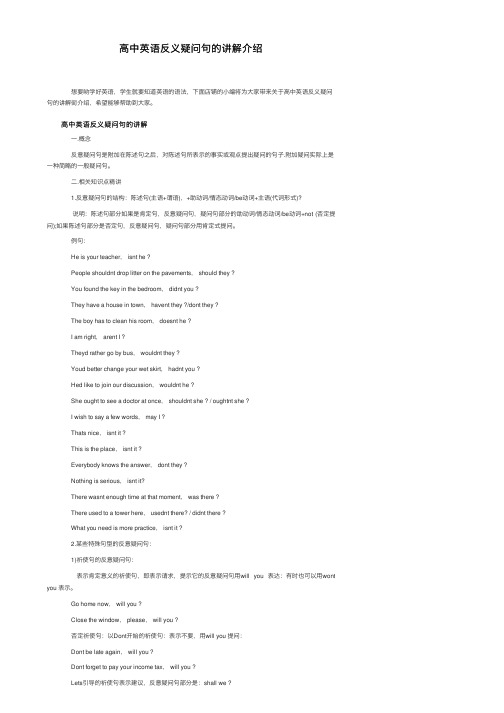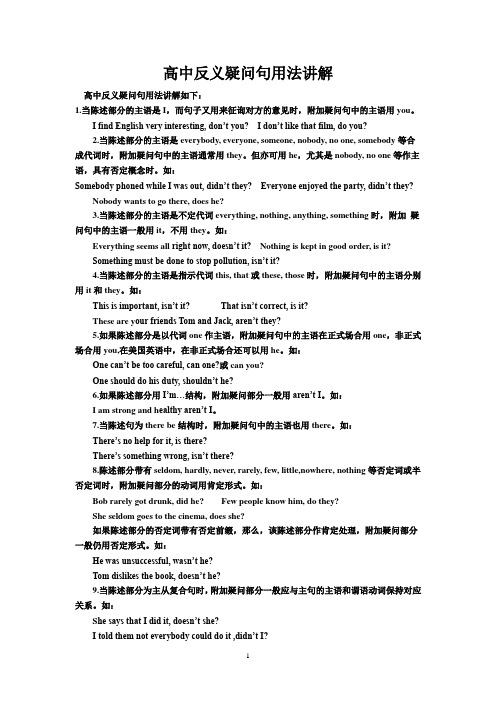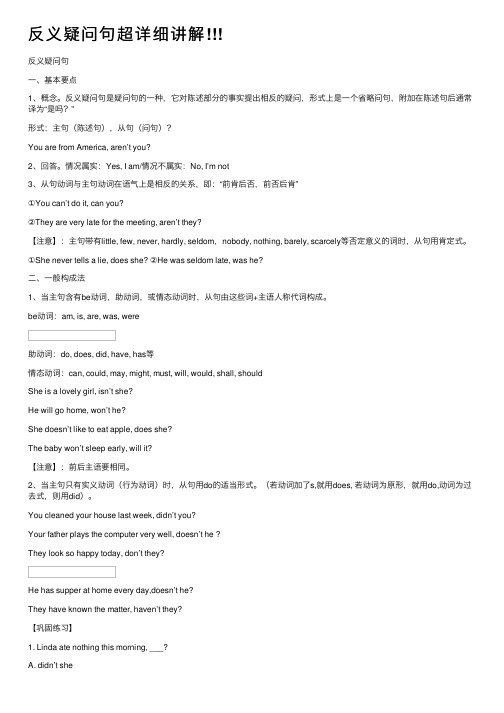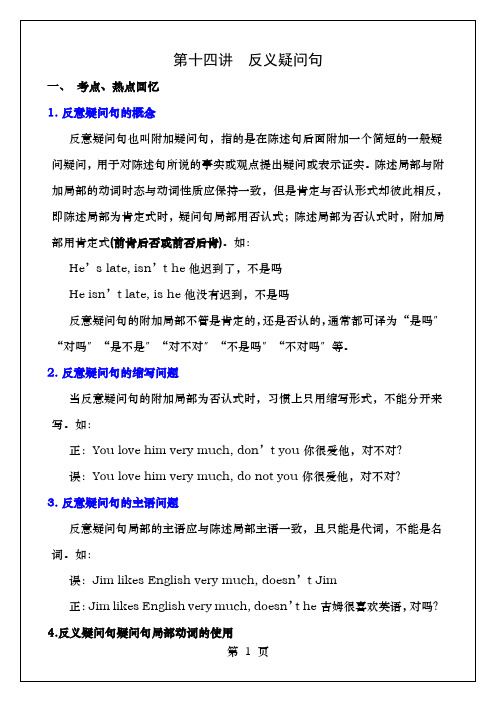高中反义疑问句讲解精讲精析(老师)
高中英语反义疑问句的讲解介绍

⾼中英语反义疑问句的讲解介绍 想要哟学好英语,学⽣就要知道英语的语法,下⾯店铺的⼩编将为⼤家带来关于⾼中英语反义疑问句的讲解街介绍,希望能够帮助到⼤家。
⾼中英语反义疑问句的讲解 ⼀.概念 反意疑问句是附加在陈述句之后,对陈述句所表⽰的事实或观点提出疑问的句⼦.附加疑问实际上是⼀种简略的⼀般疑问句。
⼆.相关知识点精讲 1.反意疑问句的结构:陈述句(主语+谓语),+助动词/情态动词/be动词+主语(代词形式)? 说明:陈述句部分如果是肯定句,反意疑问句,疑问句部分的助动词/情态动词/be动词+not (否定提问);如果陈述句部分是否定句,反意疑问句,疑问句部分⽤肯定式提问。
例句: He is your teacher, isnt he ? People shouldnt drop litter on the pavements, should they ? You found the key in the bedroom, didnt you ? They have a house in town, havent they ?/dont they ? The boy has to clean his room, doesnt he ? I am right, arent I ? Theyd rather go by bus, wouldnt they ? Youd better change your wet skirt, hadnt you ? Hed like to join our discussion, wouldnt he ? She ought to see a doctor at once, shouldnt she ? / oughtnt she ? I wish to say a few words, may I ? Thats nice, isnt it ? This is the place, isnt it ? Everybody knows the answer, dont they ? Nothing is serious, isnt it? There wasnt enough time at that moment, was there ? There used to a tower here, usednt there? / didnt there ? What you need is more practice, isnt it ? 2.某些特殊句型的反意疑问句: 1)祈使句的反意疑问句: 表⽰肯定意义的祈使句,即表⽰请求,提⽰它的反意疑问句⽤will you 表达:有时也可以⽤wont you 表⽰。
高中英语反义疑问句的讲解介绍.doc

高中英语反义疑问句的讲解介绍高中英语反义疑问句的讲解一.概念反意疑问句是附加在陈述句之后,对陈述句所表示的事实或观点提出疑问的句子.附加疑问实际上是一种简略的一般疑问句。
二.相关知识点精讲1.反意疑问句的结构:陈述句(主语+谓语),+助动词/情态动词/be动词+主语(代词形式)?说明:陈述句部分如果是肯定句,反意疑问句,疑问句部分的助动词/情态动词/be动词+not (否定提问);如果陈述句部分是否定句,反意疑问句,疑问句部分用肯定式提问。
例句:He is your teacher,isnt he ?People shouldnt drop litter on the pavements,should they ?You found the key in the bedroom,didnt you ?They have a house in town,havent they ?/dont they ?The boy has to clean his room,doesnt he ?I am right,arent I ?Theyd rather go by bus,wouldnt they ?Youd better change your wet skirt,hadnt you ?Hed like to join our discussion,wouldnt he ?She ought to see a doctor at once,shouldnt she ? / oughtnt she ?I wish to say a few words,may I ?Thats nice,isnt it ?This is the place,isnt it ?Everybody knows the answer,dont they ?Nothing is serious,isnt it?There wasnt enough time at that moment,was there ?There used to a tower here,usednt there? / didnt there ?What you need is more practice,isnt it ?2.某些特殊句型的反意疑问句:1)祈使句的反意疑问句:表示肯定意义的祈使句,即表示请求,提示它的反意疑问句用will you 表达:有时也可以用wont you 表示。
高中英语反义疑问句详细

反义疑问句反义() 即附加疑问句。
它表示提问人的看法,没有把握,需要对方证实。
反义疑问句由两部分组成:前一部分是一个,后一部分是一个简短的疑问句,两部分的人称时态应保持一致。
主要形式:部分肯定式+疑问部分否定式;陈述部分否定式+疑问部分肯定式。
1简述陈述部分和疑问部分要么前肯后否,要么前否后肯。
这类反义疑问句有时带有感情色彩,表示惊奇,愤怒,讽刺,不服气等。
例如: a 's ,'t ?你说这就叫一天的活儿,不是吗?2句式句子结构1.陈述部分肯定句+疑问部分否定句(可记为前肯后否).例:, ’t ?2.陈述部分否定句+疑问部分肯定句(可记为前否后肯).例:'t , ?句子类型一种是反义的附加疑问句;一种是非反义的附加疑问句。
简单来说,就是“前肯后否”或“前否后肯”。
3读法规则反义疑问句陈述部分用降调,问句部分可升可降。
提问者对陈述部分把握较大时,问句部分用降调;反之用升调。
4速记方法前肯后否,前否后肯,前后,前情态后情态,前无或情态后加助,并改为否定,时态一致。
5主语一般词语附加疑问句中用和主句一致的主语,用。
附加疑问句随从句。
不定代词当陈述部分的主语是(1)时,后面的可用.(2)时,后面附加疑问句中主语用。
(3)时,附加疑问句中主语用不用(4), ,或, 时,附加疑问句中主语用或.(5),,,,,等时,附加疑问句中主语一般用(口头语,非正式文体)(正式文体)。
(6)不定式时,,其他短语,附加疑问句中主语一般用。
(7)句型时,附加疑问句中一般用情态动词/。
6否定意义的词(1)当陈述部分有,, ,,,, , ,,, , , , 等否定意义的词汇时,后面的则为肯定形式:', ?, ?, ?(2)当陈述部分的主语为等表示人的不定代词时,疑问部分的主语用或:a , ’t \'t ?(3)当陈述部分的主语为等表示物的不定代词时,疑问部分的主语用:, ’t ?(4)当陈述部分含有否定意思的词是,等含有否定词缀的,也就是有前缀、后缀等含有而意思否定的词,当做处理,疑问部分要用否定形式。
(完整版)英语语法:反义疑问句专项讲解.doc

(完整版)英语语法:反义疑问句专项讲解.doc反义疑问句一、反义疑问句又叫附加疑问句。
反义疑问句由两部分组成:前一部分是一个陈述句,后一部分是一个简短的疑问句,两部分的人称时态应保持一致。
1.陈述部分为肯定式 + 疑问部分为否定式(如果陈述部分的否定词带有否定前缀,那么,该陈述部分作肯定处理,附加疑问部分一般仍用否定形式)e.g. She was ill yesterday, wasn’ t she?Tom dislikes the book, doesn’ t he?2. 陈述部分为否定式+ 疑问部分为肯定式(陈述部分用no, nothing, nobody, never, few, seldom, hardly, rarely, little等否定或半否定含义的词时,疑问部分用肯定式。
)e.g. He can ’ t ride a bike, can he?Some plants never blown ( 开花 ), do they ?二、附加疑问句(一)主语的选择1.陈述部分的主语是I ,疑问部分要用aren't I.I ’ m as tall as your sister, aren't I?注:当陈述部分的主语是I,而句子又用来征询对方的意见时,附加疑问句中的主语用you。
如:I find English very interesting, don’t you?I don ’t like that film, do you?2.当陈述部分的主语是everybody, everyone, someone, nobody, no one, somebody 等合成代词时,附加疑问句中的主语通常用they,亦可用 he,如:Somebody phoned while I was out, didn’t they?Everyone enjoyed the party, didn’t they?Nobody wants to go there, does he?3.当陈述部分的主语是不定代词everything, nothing, anything, something时,附加疑问句中的主语一般用it ,如:Everything seems all right now, doesn’t it?Nothing is kept in good order, is it?Something must be done to stop pollution, isn’t it?4.当陈述部分的主语是指示代词this, that 或 these, those 时,附加疑问句中的主语分别用it 和 they,如:This is important, isn’t it?That isn ’t correct, is it?These are your friends Tom and Jack, aren’t they?5.如果陈述部分是以代词one 作主语,附加疑问句中的主语在正式场合用one,非正式场合下可以用you 或 he,如:One can’t be too careful, can one?或 can you?One should do his duty, shouldn’t he?16.当陈述句为there be 结构时,附加疑问句中的主语也用there。
(2021年整理)高中英语反义疑问句(详细)

高中英语反义疑问句(详细)编辑整理:尊敬的读者朋友们:这里是精品文档编辑中心,本文档内容是由我和我的同事精心编辑整理后发布的,发布之前我们对文中内容进行仔细校对,但是难免会有疏漏的地方,但是任然希望(高中英语反义疑问句(详细))的内容能够给您的工作和学习带来便利。
同时也真诚的希望收到您的建议和反馈,这将是我们进步的源泉,前进的动力。
本文可编辑可修改,如果觉得对您有帮助请收藏以便随时查阅,最后祝您生活愉快业绩进步,以下为高中英语反义疑问句(详细)的全部内容。
反义疑问句反义疑问句(The Disjunctive Question) 即附加疑问句。
它表示提问人的看法,没有把握,需要对方证实. 反义疑问句由两部分组成:前一部分是一个陈述句,后一部分是一个简短的疑问句,两部分的人称时态应保持一致。
主要形式:陈述部分肯定式+疑问部分否定式;陈述部分否定式+疑问部分肯定式。
1简述陈述部分和疑问部分要么前肯后否,要么前否后肯.这类反义疑问句有时带有感情色彩,表示惊奇,愤怒,讽刺,不服气等。
例如:You call this a day’s work,don’t you?你说这就叫一天的活儿,不是吗?2句式句子结构1.陈述部分肯定句+疑问部分否定句(可记为前肯后否).例:They work hard,don’t they?2.陈述部分否定句+疑问部分肯定句(可记为前否后肯)。
例:You didn't go, did you?句子类型一种是反义的附加疑问句;一种是非反义的附加疑问句.简单来说,就是“前肯后否”或“前否后肯”.3读法规则反义疑问句陈述部分用降调,问句部分可升可降。
提问者对陈述部分把握较大时,问句部分用降调;反之用升调。
4速记方法前肯后否,前否后肯,前be后be,前情态后情态,前无be或情态后加助,并改为否定,时态一致。
5主语一般词语附加疑问句中主语用和主句一致的主语,用主格。
附加疑问句随从句.不定代词当陈述部分的主语是(1)one时,后面的疑问句可用one/he。
(完整word版)高中反义疑问句

高中反义疑问句用法讲解高中反义疑问句用法讲解如下:1.当陈述部分的主语是I,而句子又用来征询对方的意见时,附加疑问句中的主语用you。
I find English very interesting, don’t you?I don’t like that film, do you?2.当陈述部分的主语是everybody, everyone, someone, nobody, no one, somebody等合成代词时,附加疑问句中的主语通常用they。
但亦可用he,尤其是nobody, no one等作主语,具有否定概念时。
如:Somebody phoned while I was out, didn’t they?Everyone enjoyed the party, didn’t they?Nobody wants to go there, does he?3.当陈述部分的主语是不定代词everything, nothing, anything, something时,附加疑问句中的主语一般用it,不用they。
如:Everything seems all right now, doesn’t it?Nothing is kept in good order, is it?Something must be done to stop pollution, isn’t it?4.当陈述部分的主语是指示代词this, that或these, those时,附加疑问句中的主语分别用it和they。
如:This is important, isn’t it?That isn’t correct, is it?These are y our friends Tom and Jack, aren’t they?5.如果陈述部分是以代词one作主语,附加疑问句中的主语在正式场合用one,非正式场合用you,在美国英语中,在非正式场合还可以用he。
反义疑问句超详细讲解!!!

反义疑问句超详细讲解反义疑问句⼀、基本要点1、概念。
反义疑问句是疑问句的⼀种,它对陈述部分的事实提出相反的疑问,形式上是⼀个省略问句,附加在陈述句后通常译为“是吗?”形式:主句(陈述句),从句(问句)?You are from America, aren’t you?2、回答。
情况属实:Yes, I am/情况不属实:No, I’m not3、从句动词与主句动词在语⽓上是相反的关系,即:“前肯后否,前否后肯”①You can’t do it, can you?②They are very late for the meeting, aren’t they?【注意】:主句带有little, few, never, hardly, seldom,nobody, nothing, barely, scarcely等否定意义的词时,从句⽤肯定式。
①She never tells a lie, does she? ②He was seldom late, was he?⼆、⼀般构成法1、当主句含有be动词,助动词,或情态动词时,从句由这些词+主语⼈称代词构成。
be动词:am, is, are, was, were助动词:do, does, did, have, has等情态动词:can, could, may, might, must, will, would, shall, shouldShe is a lovely girl, isn’t she?He will go home, won’t he?She doesn’t like to eat apple, does she?The baby won’t sleep early, will it?【注意】:前后主语要相同。
2、当主句只有实义动词(⾏为动词)时,从句⽤do的适当形式。
(若动词加了s,就⽤does, 若动词为原形,就⽤do,动词为过去式,则⽤did)。
高中反义疑问句讲解精讲精析老师

第十四讲反义疑问句一、考点、热点回忆1. 反意疑问句的概念反意疑问句也叫附加疑问句,指的是在陈述句后面附加一个简短的一般疑问疑问,用于对陈述句所说的事实或观点提出疑问或表示证实。
陈述局部与附加局部的动词时态与动词性质应保持一致,但是肯定与否认形式却彼此相反,即陈述局部为肯定式时,疑问句局部用否认式;陈述局部为否认式时,附加局部用肯定式(前肯后否或前否后肯)。
如:He’s late, isn’t he 他迟到了,不是吗He isn’t late, is he 他没有迟到,不是吗反意疑问句的附加局部不管是肯定的,还是否认的,通常都可译为“是吗〞“对吗〞“是不是〞“对不对〞“不是吗〞“不对吗〞等。
2. 反意疑问句的缩写问题当反意疑问句的附加局部为否认式时,习惯上只用缩写形式,不能分开来写。
如:正:You love him very much, don’t you 你很爱他,对不对?误:You love him very much, do not you 你很爱他,对不对?3. 反意疑问句的主语问题反意疑问句局部的主语应与陈述局部主语一致,且只能是代词,不能是名词。
如:误:Jim likes English very much, doesn’t Jim正:Jim likes English very much, doesn’t he 吉姆很喜欢英语,对吗?4.反义疑问句疑问句局部动词的使用疑问句局部动词的使用要根据陈述句而定.Be 动词1. You are an actor, ____________2. She is going to visit me, ___________3. It wasn’t fine yesterday, ________行为动词:1. It often rains here, ___________2. You have a headache, ________3. I called you yesterday, _______4. It doesn’t rain here, ______5.You didn’t call me yesterday, ______助动词/情态动词:1. You will go to America, ___________2. We have ever been to Shanghai, ________3. He hasn’t done his homework, _________4. You should try your best, ____________不管前句是肯定的还是否认的,答复时内容是肯定的, 就用yes; 反之, 那么用noIt didn’t rain last week, ___ it上周没下雨吧是的,没下雨。
- 1、下载文档前请自行甄别文档内容的完整性,平台不提供额外的编辑、内容补充、找答案等附加服务。
- 2、"仅部分预览"的文档,不可在线预览部分如存在完整性等问题,可反馈申请退款(可完整预览的文档不适用该条件!)。
- 3、如文档侵犯您的权益,请联系客服反馈,我们会尽快为您处理(人工客服工作时间:9:00-18:30)。
We have to get there at eight tomorrow, _________ ?She has to do her homework, _________ ?(5).如果陈述部分是以代词one作主语,附加疑问句中的主语在正式场合用one,非正式场合用you,在美国英语中,在非正式场合还可以用he。
如:One can' t be too careful, _________ ?One should do his duty, _________ ?(6).如果陈述部分用I ' m•结构,附加疑问部分一般用aren '。
如:I am strong and healthy aren ? ' t II ' m late again, _______ ?I ' m not the only one to come, ________ ?(7) .当陈述句为there be结构时,附加疑问句中的主语也用there。
如:There' s no help for it, __________ ?There' s something wrong _________ ?(8) . 陈述部分带有seldom, hardly, n ever, rarely, few, little, no where, no thi ng 等否定词高中反义疑问句讲解精讲精析(老师)或半否定词时,附加疑问部分的动词用肯定形式。
如:Bob rarely got drunk, ___________ ?Few people know him, ___________ ?She seldom goes to the cin ema, _________ ?如果陈述部分的否定词带有否定前缀,那么,该陈述部分作肯定处理,附加疑问部分般仍用否定形式。
如:He was un successful, __________Tom dislikes the book, __________It is impossible, ___________ ?(9)•当陈述部分为主从复合句时,附加疑问部分一般应与主句的主语和谓语动词保持对应关系。
如:She says that I did it, ___________ ?I told them not everybody could do it __________ ?但当陈述部分的主语是l/we,谓语是think, believe, suppose, expec这类动词时,附加疑问部分则往往与从句中的主语和谓语动词保持对应关系,但要注意否定的转移。
I suppose that he ' s seri ___________ ?I don ' t think she care __________ ?(10)•当陈述部分是并列句,附加疑问句则需和就近的分句的主语和谓语一致。
如:Xiao Lin has bee n writi ng letters all after noon but he should finish them now, should n(11) .在由祈使句+附加疑问”构成的附加疑问句中,附加疑问部分一般用will you, won you。
如:Don t pen the door, will you?Give me some cigarettes, will you?Take a rest, will you?但是,以let '开头的祈使句,附加疑问部分用shall we;以let us开头的祈使句,疑问部分用will you。
如:Let' s have a basketball match this after noon, shall we?Let us go out for a rest, will you?(12)•当陈述部分带有情态动词must表示必须”时,疑问部分用mustn'。
如:You must work hard next term, mustn ' t you?I must answer the letter, mustn ' t I?但若表推测这层含义时,不能用must,而要根据陈述部分的不定式结构(即must之后的动词)以及含义采用相应的动词形式。
如:You must have made a mistake, haven ' t you?They must have seen the film last week, didn ' t they?He must be in the library, isn ' t he?(13).当陈述部分含有情态动词used to时,疑问部分可用usedn'或didn '。
如:The old man used to smoke, did n 或t ihseidn' t he?Tom used to live here, usedn 或dlidin?' t he?(14) .当陈述部分带有情态动词ought to时,疑问部分用oughtn '或shouldn '。
如:He ought to know the answer, oughtn ' t he?We ought to read this book, oughtn 或shouldn ' t we?(15).当陈述部分含有had better时,疑问部分用had。
女口:You' d better finish your homework now, hadn ' t you?高中反义疑问句讲解精讲精析(老师)(16) .陈述部分有would rather +动词原形,附加疑问部分多用would n't +主语。
He would rather read it ten times tha n recite it, would n't he?(17) .陈述部分有You'd like to +动词原形,附加疑问部分用would n't +主语。
You'd like to go with me, would n't you?(18)•感叹句后的附加疑问句的谓语动词需用be的现在时,且常用否定形式。
如:What a clever boy, isn he? tWhat a lovely day, isn ' t it?(19)•陈述句子中的主语为动词不定式短语、动名词短语或其他短语时,疑问部分的主语通常用it。
如:Learning how to repair motors takes a long time, doesn ' t it?Between six and seven will suit you, won ' t it?Where to hold the meeting has not been decided, has it?(20)•陈述句中的谓语动词是wish,表示愿望时用may,且用肯定形式。
如:I wish to have a cha nee to lear n En glish, may I?(21).当陈述部分带有表示所有”含义的动词have(has时,疑问部分既可用have形式, 也可用do形式。
如:You have a new bike, haven ' t(或udon' t yoju ?She doesn' t have any money in her pockdo,es she?(22).带情态动词dare或need 的反意疑问句,附加疑问部分常用need (dare ) +fc语。
We n eed not do it aga in, n eed we ?He dare not say so, dare you?当dare, need为实义动词时,附加疑问部分用助动词do +主语。
She does n't dare to go home alone, does she?.典型例题反义疑问句1.It ' s vdhyt today, _______________ ?2. He can speak Chin ese, ______________3. Meimei studies in a middle school, ______________4. He n ever gets up late , ______________ ?5. Don 'go out at night, ______________ ?6. He n ever loves cold weather , ______________ ?7. You fini shed the task yesterday, ______________ ?8.It _______________ a good day for swimmi ng, is it?9. Tom has bee n to Sin gapore , _____________ ?10. The story is little in terest ing, _____________ ?单项选择1. Linda ate no thi ng this morni ng, _ ?A. didn ' t shB. was sheC. did sheD. wasn ' t she2. There ' s hardly ___ m ilk in the bottle, _____ there?A. no, isn 'B. some, isC. little, isnD.alny, is高中反义疑问句讲解精讲精析(老师)A. isn ' t itB. is itC. isnD. tsthteeee13. _______________________________________ They n eed our help badly at the moment, __________________________________________ ?A. needn ' t theyB. need theyC. don ' t Dhedo they 14.She is unfit for the position, ?A. is sheB. isn ' t sheC. doesn ' Dsheoes she15.1 wish to visit America, _______ ?A. don ' t IB. can IC. may ID. may you 16.She ' s beenvorker here for many years, ?A. isn ' t sheB. is sheC. hasn ' t sheD. has she17. _________________________ W hat beautiful flowers, ?A. aren ' t theyB. are theyC. isn ' t itD. is it18. Mother used to live in a poor village,_ A. used she B. used n' t she C. did n19. ____________________________ You ' d better go at once, _______________ ?A. wouldn ' t youB. had youC. hadn 20.I am very in terested in Mark Twain A. aren ' t I B. am not I C. aren ' t youD. are youKeys:1-5 DCBAB 6-10 BBACD 11-15 ADABC 16-20 CABCAtDedid heDycHJnouldyou。
